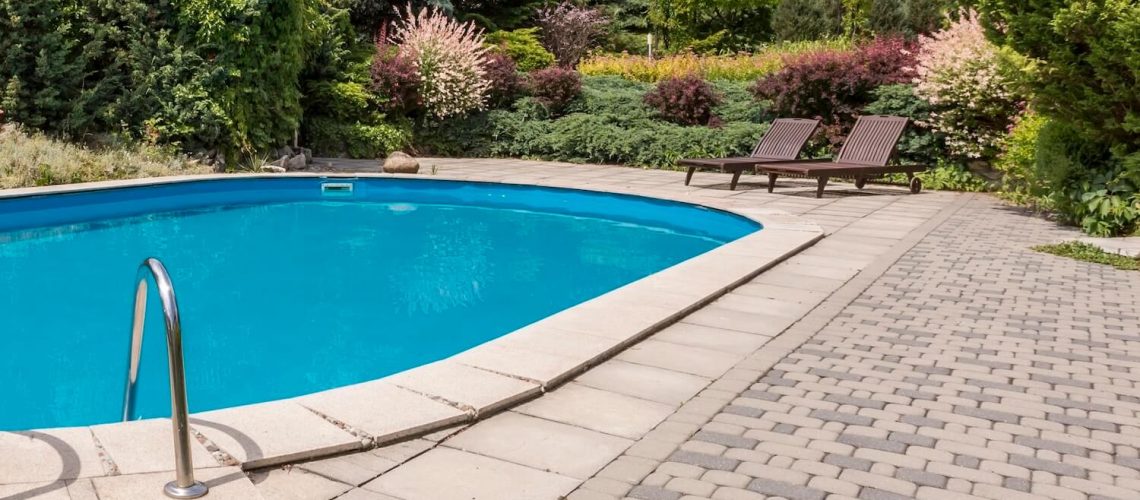When designing a pool deck, the choice between pavers and concrete is significant, as it impacts the longevity, appearance, and functionality of your outdoor space. Pool decks must withstand constant exposure to water, sunlight, and heavy foot traffic. While concrete has long been the traditional choice, pavers are emerging as the preferred alternative due to their durability, aesthetic flexibility, and resistance to cracking. Let’s dive into the reasons why pavers are better than concrete for pool decks and how they can transform your pool area into a beautiful, long-lasting oasis.
1. Understanding Pool Deck Materials: Pavers vs. Concrete
Selecting the right material for a pool deck is more than just a design choice. Each material has its unique strengths and weaknesses that can impact both the appearance and functionality of your pool area.
- Pavers are made from individual stone, brick, or concrete units that fit together in interlocking patterns. They create a stable surface that remains flexible and durable, able to handle shifts in the ground and seasonal changes.
- Concrete, on the other hand, is typically poured in large slabs. While it can be stamped or stained to achieve certain looks, it remains a solid surface, which makes it more vulnerable to cracks over time.
Pavers offer a blend of flexibility, durability, and customization, while concrete has a more uniform look but requires more maintenance and is prone to damage over time. For pool decks specifically, the flexibility and maintenance advantages of pavers make them a superior option.
2. Crack Resistance: Why Pavers Outperform Concrete Over Time
One of the most significant drawbacks of concrete is its susceptibility to cracking. Over time, concrete is prone to developing cracks due to shifting soil, temperature fluctuations, and the constant exposure to pool water. Even when expansion joints are added, cracks are inevitable.
Why pavers don’t crack as easily:
- Flexible design: Since pavers are composed of individual units, they can flex and shift slightly with the ground, adapting to the changes rather than cracking under pressure.
- Easier to repair: Should a paver crack or become damaged, it’s easy to replace just that single unit without disrupting the entire pool deck. Concrete, on the other hand, requires patching, resurfacing, or even complete replacement for widespread damage.
This flexibility allows pavers to stay intact even as the ground shifts, giving them a clear advantage for pool decks where water exposure, ground movement, and temperature changes are all common.
3. Long-Term Durability and Lifespan
Durability is crucial for pool decks, which endure year-round exposure to harsh weather conditions and constant moisture from pool water. In this regard, pavers offer a much longer lifespan than concrete.
Durability benefits of pavers:
- Weather resistance: High-quality pavers are manufactured to withstand extreme weather, from the sun’s UV rays to freeze-thaw cycles in colder climates. Concrete, while durable at first, can weaken over time, leading to cracks, chips, and surface erosion.
- Stain resistance: Pavers are often sealed to protect against stains from leaves, dirt, and pool chemicals. Concrete, by contrast, can stain easily if not sealed regularly, and pool chemicals can lead to discoloration over time.
Investing in a paver pool deck means choosing a material that will look great and function well for decades, without the need for frequent repairs or costly resurfacing.
4. Enhanced Safety for Poolside Activities
Safety is essential in a pool area where slippery surfaces increase the risk of accidents. Pavers generally provide a safer, slip-resistant surface compared to concrete, especially around wet areas.
Safety benefits of pavers:
- Non-slip surfaces: Many pavers come with natural or textured surfaces that provide grip even when wet, which reduces the chances of slipping. Textured concrete, while available, often requires extra treatments to achieve the same level of slip resistance.
- Temperature control: Some pavers are designed to retain less heat than concrete, making them cooler underfoot on sunny days. This can make a significant difference, especially in hot climates, where concrete can become uncomfortable to walk on during peak summer months.
By choosing slip-resistant pavers that stay cooler underfoot, homeowners can ensure a safer, more comfortable pool area for family and guests.
5. Unmatched Aesthetic Flexibility
Pavers offer a wide range of design options, including different shapes, colors, textures, and patterns. This flexibility allows homeowners to create a truly custom look that complements their pool, landscape, and home architecture.
Design benefits of pavers:
- Customization: Pavers come in an extensive variety of colors, shapes, and sizes, allowing for a completely customized pool deck. Homeowners can mix and match paver styles to create unique designs, from classic to modern or even intricate mosaics.
- Enhanced curb appeal: A paver pool deck has a high-end appearance that can elevate the entire backyard. For homeowners who may sell their property in the future, a paver deck adds both aesthetic and market value.
- Design adaptability: If you ever decide to expand or reconfigure your pool deck, adding new pavers to match the existing design is easier than trying to blend new concrete with an existing slab.
Pavers allow homeowners to create a luxurious, sophisticated pool area that can match or enhance any architectural style, making the pool deck a standout feature in the landscape.
6. Maintenance: Pavers Are Easier to Clean and Repair
One of the biggest advantages of pavers over concrete is the low maintenance they require. Because pool decks are subject to water splashes, foot traffic, and outdoor elements, having a deck that’s easy to maintain is essential.
Maintenance benefits of pavers:
- Easy repairs: If a paver becomes cracked, chipped, or stained, it’s easy to replace that one piece. With concrete, a crack or stain typically requires resurfacing or patching, which can be costly and time-consuming.
- Simple cleaning: Many pavers are treated with sealants, making them resistant to stains from pool chemicals, spilled drinks, and natural elements. A basic cleaning routine with water and mild soap can keep pavers looking fresh, whereas concrete may require power washing and regular sealing to maintain its appearance.
The ease of maintaining a paver pool deck makes it a smart choice for busy homeowners who want to spend more time enjoying their pool than maintaining it.
7. Environmentally Friendly Option
As eco-friendly landscaping options become more popular, pavers offer a more sustainable choice than traditional concrete. Many paver manufacturers now produce permeable pavers, which help reduce water runoff and support groundwater replenishment.
Eco-friendly benefits of pavers:
- Permeable options: Permeable pavers allow water to seep through the gaps between each unit, reducing water runoff that can lead to erosion or pooling around the pool area. This is especially beneficial for pool decks, where standing water can cause safety hazards and slippery surfaces.
- Recyclable materials: Many pavers are made from recyclable materials, and if you ever decide to replace your paver pool deck, the pavers themselves can often be repurposed in other projects. Concrete, however, typically ends up as construction waste.
By choosing permeable pavers, homeowners can reduce their environmental footprint while enjoying a pool deck that benefits from natural drainage and water management.
8. Cost Effectiveness: An Investment That Pays Off Over Time
While pavers may have a higher upfront cost than poured concrete, they often prove to be more economical over time. Their durability and lower maintenance requirements translate to savings that offset their initial expense.
Cost benefits of pavers:
- Reduced repair costs: Because pavers are individual units, repairs are inexpensive. Cracks and damage in concrete can mean expensive resurfacing or patching.
- Lower maintenance expenses: Sealing, power washing, and repairing concrete can become costly over time, whereas pavers only require occasional sweeping, rinsing, and sealing.
The initial investment in pavers pays off through their durability, resilience, and ease of maintenance, making them a smart long-term choice.
9. Adaptability to Installation Requirements
Installing pavers may take slightly longer than pouring concrete, but their adaptable nature makes the installation process more forgiving when it comes to soil stability and ground shifts.
Installation benefits of pavers:
- Suitable for varied terrain: Because pavers are laid in individual units, they can adapt to slight shifts in soil or uneven surfaces. This means fewer issues with settling or shifting, which can easily lead to cracks in concrete slabs.
- Lower risk of post-installation issues: With a solid foundation and proper installation, pavers create a lasting pool deck without the risk of major surface issues, making up for any added installation time or labor.
When properly installed, pavers create a resilient surface that’s less prone to the settling issues that often plague concrete pool decks.
10. Boosting Property Value and Curb Appeal
For homeowners considering the resale potential of their property, a paver pool deck is an excellent investment. The luxurious look of pavers and their practical benefits make a strong impression on potential buyers.
Resale and curb appeal benefits of pavers:
- Increased property value: Paver pool decks often add more value to a property than concrete due to their durability, low maintenance, and aesthetic appeal.
- High-end appearance: The sophistication of a well-designed paver deck enhances the pool area, making it a focal point of the backyard. This can make the home more attractive to future buyers looking for both style and function.
Conclusion: Why Pavers Are the Clear Winner for Pool Decks
Choosing the right material for a pool deck requires considering not just the immediate costs, but also the long-term benefits and performance. Pavers excel in durability, maintenance, safety, and aesthetics, making them a superior choice for pool decks over concrete. With their flexibility, eco-friendliness, and cost-effectiveness, pavers provide homeowners with a beautiful, functional, and lasting pool deck that they can enjoy for years to come.

